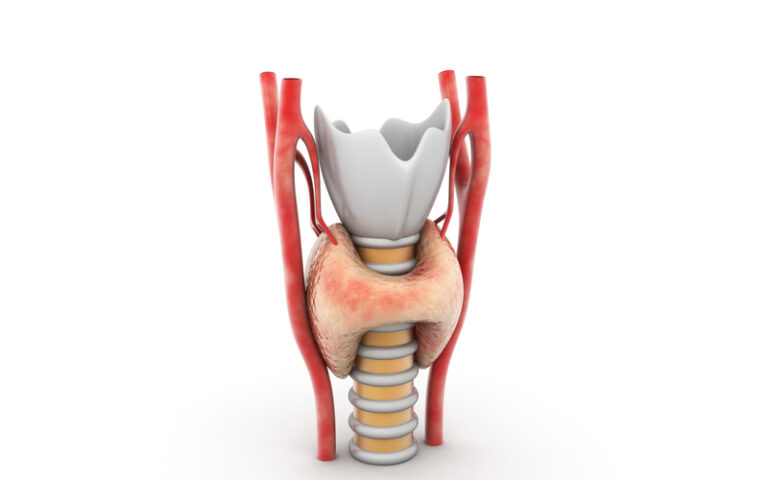Of all health concerns in the U.S. and perhaps in the world, excess weight is amongst the greatest concern. There are many reasons why someone would gain weight and/or have a difficult time losing it. Many think the person is just over-eating, but many times it is quite the opposite. And having said that, if someone is over-eating, it is just as important to find out why. There are reasons for that as well. In this 2-part series, it would be welcome, I’m sure, to cover all the reasons, or at least many of the reasons why someone has a difficult time maintaining a healthy weight, but instead, we’re only going to cover two: thyroid and adrenals. The rest of the reasons will be covered at a later date.
The thyroid is a small gland that sits at the base of the neck (front of neck). It produces 3 hormones: T3, T4 and Calcitonin. It is responsible for your metabolism, responsible for heart control, muscle and digestive function, brain development, bone maintenance and energy. As with all glands and organs in the body, it has a mineral that is necessary for it to function properly. In the case of the thyroid, that mineral is iodine. It also needs some amino acids (protein), especially tyrosine. The hypothalamus and pituitary glands help in the control mechanism. Thyroid Stimulating Hormone (TSH) seems to be the test of choice to determine thyroid health. It is produced by the pituitary. The higher it is above normal, the harder the pituitary is hammering on the thyroid trying to get it to work.
But the other tests are important as well. It is important to know how well the thyroid is making T4 and converting it to T3. It is also important to know if there is an auto-immune thyroid condition going on. It is not unusual for a patient to complain that they have all the symptoms of hypo or hyperthyroidism, but their lab tests are “normal”. I may agree and dig deeper and find antibodies against the thyroid (have your doctor do a Thyroid Peroxidase (TPO) test), despite having normal TSH.
The bottom line is, if the thyroid isn’t working right, you can gain weight. If it’s not working right, you may be too tired to exercise or too tired to cook a healthy meal.
Several studies have found correlations with obesity and TSH, but a direct link has not been defined. It is suspected though that the link is in insulin resistance. Blood sugar dysregulation and weight gain have had a strong link for many decades.
Symptoms of low thyroid include: fatigue, weight gain, sleepiness, mood swings, forgetfulness, depression/irritability, swelling in legs, constipation, coarse, dry hair, loss of eyebrow hair, hair loss, heavy periods, weakness, muscle cramping and aching, hoarse voice and others.
Helping your thyroid, can help your weight.
©2020 Holly A. Carling, O.M.D., L.Ac., Ph.D.







